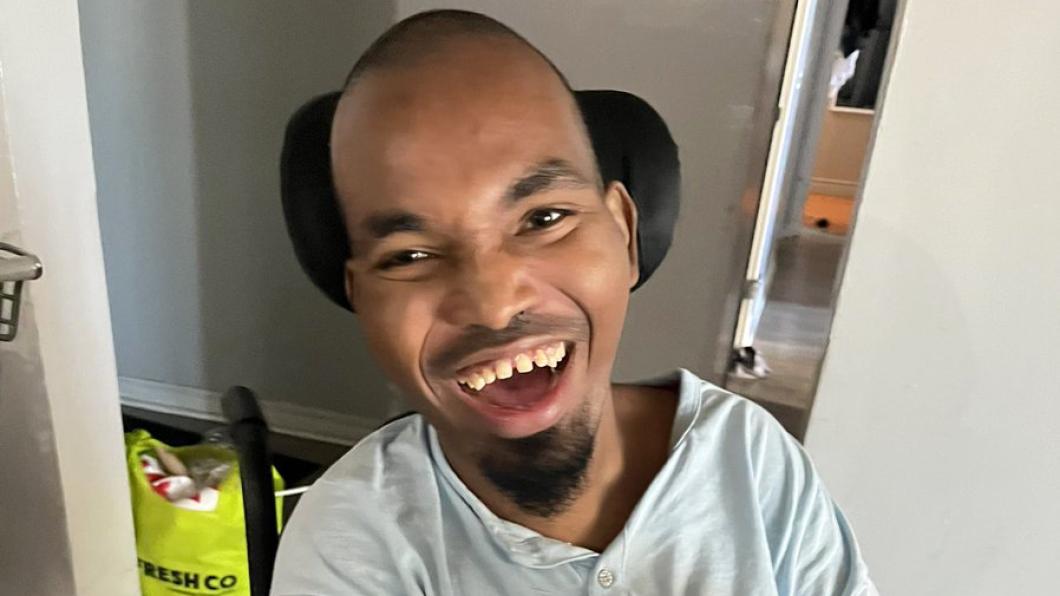
Humour helps author cope with pain
By Louise Kinross
Abdulahi (Abdi) Hassan is a former Holland Bloorview client who studied radio broadcasting and has produced podcasts, hosted radio programs and written a motivational blog. He's only 26 years old, but his memoir Speaking My Truth was just released. In the book, we get to know different facets of his personality. Sometimes he's bubbly, charming and upbeat. Other times, "As a Black, disabled Muslim, thoughts of failure and disappointment tend to overshadow my hopes and dreams," he writes. We spoke about his experiences.
BLOOM: Why did you want to write this book?
Abdi Hassan: In 2020, I lost my father and I realized life was too short, and I asked myself 'Do you want to write a memoir? Now is the time.' When my father passed away I was so down on myself for so long. I needed something to do, and the pandemic was the perfect time to do it. As I began to write I realized I don't have to prove myself to anyone, just to myself. By the grace of God, he was able to guide me and make it easy for me to write.
BLOOM: One Abdi is focused on the positive, and in fact you coined the term AbdiPositivity and had a related podcast. But at other times you write about being consumed with negative thoughts.
Abdi Hassan: Ableism is a huge barrier. I live with a physical disability in a world that is not built for someone like me. Right now in the city I see so much construction going on, but it's not usually accessible.
I write in the book about how a high school teacher embarrassed me in front of the class by saying I couldn't colour properly. That one incident really lowered my self-confidence. It might sound small to some people, but it was a huge event for me.
BLOOM: You deal with chronic pain. Do you have any coping strategies that might help other people?
Abdi Hassan: For me personally, sometimes I can recline my chair and that relieves the pressure. Other times I put on my headphones and go into the hallway of my apartment and drive around. I listen to music or podcasts and it distracts me.
BLOOM: At age 14 you were diagnosed with type 1 diabetes. You write about the unpredictability of life, and how for you, life is a bumpy ride.
Abdi Hassan: I was just beginning high school with a physical disability. Learning I had type 1 diabetes was a lot to handle for a 14-year-old. I tried to hide my diabetes as much as possible. I didn't think people would understand what it was like, and I was always afraid of being judged. Back then I wanted to be treated normal. Now I'm able to embrace it.
BLOOM: You talk about how as a younger child you tended to let other people speak for you. What role did Holland Bloorview's Youth at Work program play in helping you find a passion for radio broadcasting?
Abdi Hassan: I did a placement at The Scope radio station, at what was then called Ryerson. Working there, being able to talk on radio, and working with my buddy Casey, I was able to come out of my shell. As time went on, I learned that when I had negative thoughts, I had often forgotten to have fun.
BLOOM: Humour is a big part of your book.
Abdi Hassan: Humour helps me get through my physical pain and mental pain. I use it as a coping mechanism.
BLOOM: You write about using a Muslim dating app. You met a woman through that app and developed a relationship online. Do you hope to meet her one day?
Abdi Hassan: Yes, I would love to meet her one day. She knows she's in the memoir. When we first met it was about three months after my dad passed away. My dad and I were super close, so I wasn't really myself. When I started communicating with this girl, I felt like Abdi again.
BLOOM: You talk about your tight-knit family. Do you have any suggestions for parents raising children with disabilities?
Abdi Hassan: Family is really important for me. Without them I'd probably be miserable and wouldn't be doing what I'm doing. Even though my family members and I are opposite to each other in terms of personality, we find a way to be there for each other. And when I say family that could be cousins or aunts or uncles or nieces or nephews. They have kept me sane.
BLOOM: What are your hopes for the future?
Abdi Hassan: I hope to write another book. And to continue to build the AbdiPositivity brand.
You can follow Abdi on Twitter at @AbdiPositivity. Like this interview? Sign up for our monthly BLOOM e-letter. You'll get family stories and expert advice on raising children with disabilities; interviews with activists, clinicians and researchers; and disability news.